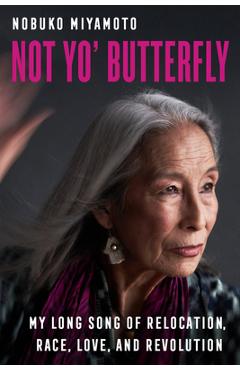Not Yo\' Butterfly, 60: My Long Song of Relocation, Race, Love, and Revolution - Nobuko Miyamoto

Detalii Not Yo\' Butterfly, 60: My
libris.ro
208.9 Lei
232.11 Lei
Biography & Autobiography
Nobuko Miyamoto
Not Yo\' Butterfly, 60: My - Disponibil la libris.ro
Pe YEO găsești Not Yo\' Butterfly, 60: My de la Nobuko Miyamoto, în categoria Biography & Autobiography.
Indiferent de nevoile tale, Not Yo\' Butterfly, 60: My Long Song of Relocation, Race, Love, and Revolution - Nobuko Miyamoto din categoria Biography & Autobiography îți poate aduce un echilibru perfect între calitate și preț, cu avantaje practice și moderne.
Caracteristici și Avantaje ale produsului Not Yo\' Butterfly, 60: My
- Departament: auto-moto-rca
- Ideal pentru iubitorii de mașini și motociclete.
- Conținutul acestui produs te ajută să întreții și să îmbunătățești performanțele vehiculului tău.
Preț: 208.9 Lei
Caracteristicile produsului Not Yo\' Butterfly, 60: My
- Brand: Nobuko Miyamoto
- Categoria: Biography & Autobiography
- Magazin: libris.ro
- Ultima actualizare: 08-04-2025 01:30:25
Comandă Not Yo\' Butterfly, 60: My Online, Simplu și Rapid
Prin intermediul platformei YEO, poți comanda Not Yo\' Butterfly, 60: My de la libris.ro rapid și în siguranță. Bucură-te de o experiență de cumpărături online optimizată și descoperă cele mai bune oferte actualizate constant.
Descriere magazin:
A mold-breaking memoir of Asian American identity, political activism, community, and purpose. Not Yo\' Butterfly is the intimate and unflinching life story of Nobuko Miyamoto--artist, activist, and mother. Beginning with the harrowing early years of her life as a Japanese American child navigating a fearful west coast during World War II, Miyamoto leads readers into the landscapes that defined the experiences of twentieth-century America and also foregrounds the struggles of people of color who reclaimed their histories, identities, and power through activism and art. Miyamoto vividly describes her early life in the racialized atmosphere of Hollywood musicals and then her turn toward activism as an Asian American troubadour with the release of A Grain of Sand --considered to be the first Asian American folk album. Her narrative intersects with the stories of Yuri Kochiyama and Grace Lee Boggs, influential in both Asian and Black liberation movements. She tells how her experience of motherhood with an Afro-Asian son, as well as a marriage that intertwined Black and Japanese families and communities, placed her at the nexus of the 1992 Rodney King riots--and how she used art to create interracial solidarity and conciliation. Through it all, Miyamoto has embraced her identity as an Asian American woman to create an antiracist body of work and a blueprint for empathy and praxis through community art. Her sometimes barbed, often provocative, and always steadfast story is now told.

Produse asemănătoare

Not Yo\' Butterfly, 60: My Long Song of Relocation, Race, Love, and Revolution - Nobuko Miyamoto
![]() libris.ro
libris.ro
Actualizat in 08/04/2025
208.9 Lei
Produse marca Nobuko Miyamoto

Not Yo\' Butterfly, 60: My Long Song of Relocation, Race, Love, and Revolution - Nobuko Miyamoto
![]() libris.ro
libris.ro
Actualizat in 08/04/2025
208.9 Lei